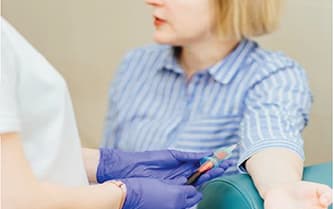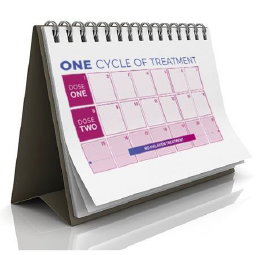Getting the timing right
You may be wondering what the difference is between an infusion and an
injection—after all, they both involve needles. Injections are more common; the needle is inserted into a muscle, fatty
tissue, or
skin and the medicine is delivered in a matter of seconds. Infusions are used for medications that need to go directly
into a vein. While some types of infusions can take a long time to administer,
the HALAVEN infusion is given over a short period—2 to 5 minutes for each dose.1
HALAVEN is given in what's called a treatment cycle. The cycle consists of 2 doses administered 1 week apart, followed
by 1 week off. Some people may require more than 1 cycle, in which case they would
start again after the completion of the week off. Your HCP will determine how many treatment cycles you will
require.1
The infusion itself is relatively quick, but a little advance planning is recommended to fit it into your busy
life. First off, you'll want to make sure you consider the whole treatment cycle when choosing a start date. You
wouldn't want a scheduling conflict to interfere with the second dose or the start of another cycle. Less obvious,
but equally important, is to have a plan for the blood tests you'll need before receiving HALAVEN. Work with your
care team to determine when to get the tests or if you need to travel to an off-site location for them.
Rest and recovery
The most common side effects of HALAVEN in adults with breast cancer include low white blood cell count (neutropenia),
low red blood cell count (anemia), weakness or tiredness, hair loss (alopecia), nausea, and constipation.1 Before you
start HALAVEN treatment, it's a good idea to talk to your HCP if you experience these side effects so you know what to
do if they occur.
Another note about scheduling: as you're planning the treatment cycle, give yourself time to rest and recover. Some
people may feel tired or weak after the infusion, so avoid making plans for after your appointment. You may want
someone to drive you to and from your appointment.
Resources
Whether you need a ride across town, or to arrange travel and an overnight stay, resources are available to help
people with mBC get to their appointments. The PAN Foundation is one of several organizations that offer transportation assistance for people who need to travel
far distances to receive care.2
mBC treatment is a lot for anyone to go through. Along with the physical aspects of the infusion and the potential
after effects, your mental and emotional well-being needs to be managed as well. You can
find a long list of mBC community groups and other support groups here. These groups are wonderful
resources, and you may be able to connect with others who have been through their treatment cycles and are willing to share their experiences.














